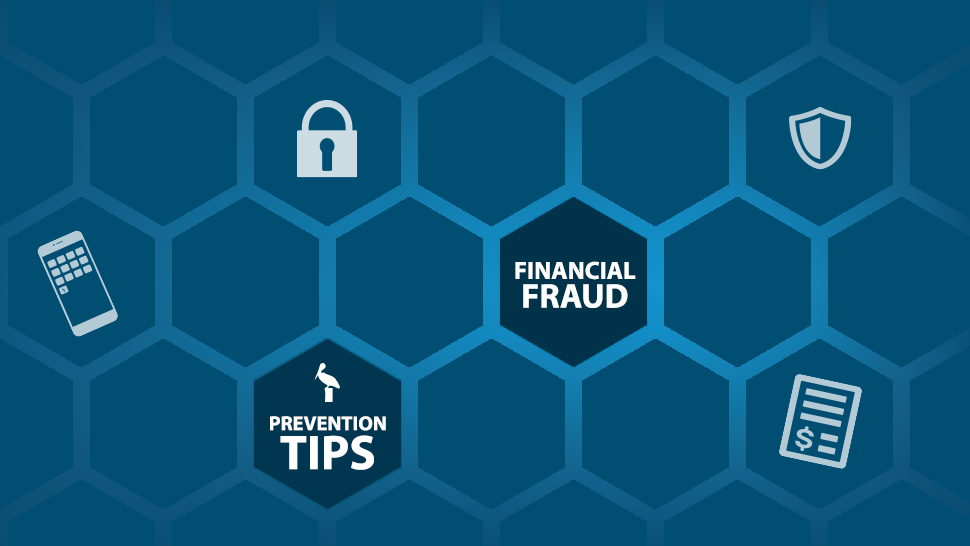Today, people are highly susceptible to having their financial health drastically impacted by fraud. Even if you or someone you know hasn’t personally been a victim of fraud, it’s important to know how you can protect yourself from it.
More often than not, people don’t realize they’ve been a victim of fraud or a scam until it’s too late. We’ve got you covered, though!
Our Nationally Certified Credit Counselors share their insight on everything you need to know about financial fraud including the types of fraud, a list of tips to help you prevent it, and more.
What exactly is financial fraud?
Financial fraud is when an individual or organization takes money or other assets from you through deception and/or illegal practices. They spend their time thinking of new ways to take advantage of a situation and get people to send money or give out their personal information.
Sensitive personal or banking information includes things like your social security number, address, checking or savings account number, debit or credit card number, login credentials, and more.
What are the different types of financial fraud?
- Website fraud: Be cautious when entering personal information on websites, even if it appears to be from reputable companies. It’s becoming increasingly common for scammers to create websites that look similar to legitimate sites. A couple things to check for in your browser’s address bar are correct spelling and the lock symbol before entering any personal information.

- Text fraud: Be cautious when clicking on links in random text messages. The most common types of fraudulent text messages are ones that offer prizes and ones claiming to give you the status of a shipment. These messages come with links which allow scammers to gain access to your phone and obtain your account information. If you receive a text message from a company that you weren’t expecting, it’s best to double check that you have signed up to receive text messages or special alerts from that company. Contact the company directly to inquire about the alert. Never click on unfamiliar links.
- Credit report fraud: Your credit report contains a large amount of your personal data as well as access into your credit file. It’s advisable to place a fraud alert on your credit report anytime you feel that you may have been a victim of a scam or that a scammer has potentially obtained any personal information that may be listed on your credit report. You should also review your children and elderly family member’s credit reports at least twice a year.
- Friend and family circles: This is the most painful and difficult way to be a victim of financial fraud. You should always use discretion with your personal information around those closest to you. This includes your passwords, credit or debit cards, cash on hand, and access to your home and security alarm codes. If it’s not pertinent to share these certain pieces of information with your family, don’t do it.
How can I prevent financial fraud?
One of the best ways to prevent financial fraud is to place a security or credit freeze on all three of your major credit bureau reports (Equifax, Experian, and Transunion).
When you place a freeze on your credit reports, most lenders, landlords, or other consumer agencies can’t access your reports without your permission. Also, in the event of a data breach within the credit bureaus, a credit freeze adds an extra layer of protection.
It’s also very easy for you to unfreeze any of your credit reports almost instantly. You are in total control of this process, and it’s completely free.
Key tip: Don’t confuse freezes with locks. They work in a similar way, but locks may have monthly fees. If you want a free freeze guaranteed by law, then ask for a freeze, not a lock.
Want more information about credit freezes?
Visit consumer.ftc.gov/articles/0497-credit-freeze-faqs to see a list of frequently asked questions and answers.What are some other steps I can take to prevent financial fraud?
- Avoid imposters. Don’t provide your account information to someone that seems to be calling from your financial institution. They’ll already have this information. If you feel that the call is suspicious, hang up and contact your financial institution to confirm the reason for the call.
- Check your credit report at least once a year. We recommend that you review your credit report for any possible suspicious activity. You can obtain a FREE copy of your credit report from AnnualCreditReport.com.
- Be careful with offers for credit monitoring services. Unless you’ve been a victim of financial fraud, paying for a service that alerts you about certain activities in your credit file isn’t worth it, especially if it’s costing you hundreds of dollars a year.
- Don’t click on unfamiliar links in emails, text messages, or social media. Always look at the sender’s email address, the time the message was sent, and any strange URLs or attachments. These are all red flags for a possible scam attempt, and if they look odd, delete them immediately.
- Use caution before giving out your social security number. If you get an email or website pop-up asking for your social security number, it’s best to not trust it. This information would only be gathered on a secure website. Only give out your social security number when you know that it’s absolutely necessary such as when you apply for a loan or apply for a new job.
Are there any helpful resources for financial fraud prevention?
Want to stop those annoying phone calls and emails? Here’s how:
- Call the National Do Not Call Registry at 888-382-1222, or visit their website at www.donotcall.gov.
- You can also opt out of prescreened offers by calling 888-567-8688 or visiting www.optoutprescreen.com.
We’ve also listed the contact information below for each of the three main credit bureaus:
- Equifax
Equifax.com/personal/credit-report-services
800-685-1111 - Experian
Experian.com/help
888-397-3742 - Transunion
TransUnion.com/credit-help
888-909-8872
To report fraud and obtain information on how different types of scams work visit the following:
- The Federal Trade Commission
www.ftc.gov - Fraud!Org
www.fraud.org - Internet Crimes
www.ic3.gov
Stay in the know.
Visit our website for a list of reported scams and to learn more about how Pelican is preventing fraud.Get to know our Nationally Certified Credit Counselors and feel free to reach out if you have any questions or would like to find out more about Pelican’s Financial Wellness Program. Credit counseling sessions are completely FREE for all Pelican members and can help you meet your financial goals!




Helpful tips! Thank you.
This is great to know. Thanks for the tips.